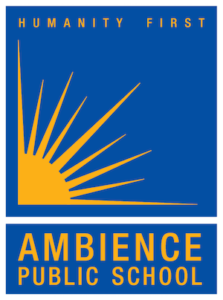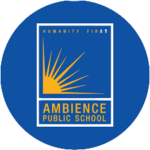Early Years Program
The Early Years program at Ambience School is for children from ages 2+ to 5+. During these years, children attend Pre-Nursery, Nursery and Kindergarten.
Our Aim
- Inculcate the joy of learning and support students in their journey of discovery.
- Help students develop a strong sense of identity, become independent and responsible, have a positive attitude and self – image, and display resilience when faced with challenges.
- Encourage students to become socially adept, capable of establishing relationships with others, being aware of fairness and justice, and ready to collaborate with peers and adults from different backgrounds and embrace diversity.
- Enable students to become effective communicators, capable of using different media for communication.
- Promoting familiarity with symbols, patterns, and their uses, versatility with the use of numbers, data handling, shapes, and measurement.
- Awareness about the natural and manmade world and their roles and responsibilities towards sustainable development.
- Helping build aesthetics appreciation and creative expression.
Our Curriculum Approach
An inquiry-based approach that supports the development of thinking and life skills at all levels through standards-based units of instruction, simulated learning, Outdoor education, and community service learning opportunities.
Our students engage actively in Inquiry, exploration, collaboration, and having fun while learning. Ethics and values, learning to do what is right-respect, Morality, Citizenship, Personal Emotional wellbeing, and Mindfulness are all an integral part of our curriculum.
Kindergarten
Four-year-olds are wonderful bundles of curiosity and creativity, energy and enterprise, imagination and ingenuity. We believe that children learn best when they have positive and nurturing relationships with adults and other children. Therefore, our skilled teachers develop an enriching curriculum, provide intentional guidance and support, and foster an environment in which our young learners can safely explore, discover, inquire, and learn.
We welcome the youngest members of our community with a commitment to inquiry and exploration as the means for learning. Our curriculum is tailored to the children’s interests, strengths, and learning styles. Led by nurturing teachers in a small classroom setting, kindergartners start to understand numbers and begin to read. They discover, plant gardens, wonder, paint self-portraits, laugh, play, create, make friends, sing and dance, write stories, explore books, run, share ideas, climb, use computers, conduct experiments, imagine, take risks, count, treasure the environment, and develop character.
Through an Inquiry-based Curriculum, there are certain key focus areas that emphasize our principles of holistic development and love for learning.
Personal and Emotional Growth
We believe that each child is unique and has a different learning style. Even though they may learn differently but they all can learn is the guiding philosophy that informs our instructional pedagogy. Through various activities, we encourage autonomy and taking ownership, which also builds self-esteem.
Numeracy
Our children learn how to count, recognize numbers up to 10, and sort objects. Using manipulative props, they learn the concepts of more & less and create patterns. Students learn data handling, explore shapes, and space.
Emotional Development
Children learn to recognize their emotions to help self-regulation. They connect with what is going on around them through their emotions. The better understand their emotions the better equipped they are to learn. At Ambience, educators are trained to observe emotional cues and respond to them. Through circle time and reflection activities, we learn to connect with our own feelings and articulate them.
Digital Literacy
“Digital literacy should be the fourth pillar of a child’s education alongside reading, writing, and mathematics and be resourced and taught accordingly.” -House of Lords Report, 2017. When digital literacy is integrated into schools. Students develop a broader range of digital skills and a better understanding of the risks involved in using technology. We believe that developing digital competence at the kindergarten level can help to raise awareness on safety issues and build critical thinking among children regarding content and devices that they use. All the classrooms have Finger Touch LED screens and easy access to tabs, which the students can use under supervision. Embracing digital literacy is key to encourage learning from kindergarten through adulthood. It is essential to a school’s success and a student’s lifelong improvement.
Spiritual Development
This quote from Henry Ford puts it well: “When I use the word spirituality, I don’t necessarily mean religion; I mean whatever it is that helps you feel connected to something that is larger than yourself.” At Ambience, we develop our approaches to support spiritual development by teaching children meditation, yoga techniques, prayer, guided visualization, responding to ‘big questions’ raised by the teachers/ young children, and the use of a reflection/spiritual focus in the classrooms. We give children the opportunities to explore spirituality across many areas through mindful sessions, circle time and reflection classes.
Physical Development
Children participate in indoor and outdoor activities. Developing both Gross Motor and Fine Motor Skills in embedded into the daily programs of our school. Being physically active is very important for children’s development. Physical activity in early childhood helps improve motor coordination and can enhance the development of various motor skills. In addition to that, understanding their own body structure, being conscious of a healthy way of living, hygiene are all given due importance.
EVS
Our young learners learn about plants, animals, good health habits, the weather and keeping track of the weather, and about the five senses and basics about their bodies. Teachers conduct simple science experiments in class and outdoors. Children also learn about their role as custodians of the planet and being responsible and respectful members of society.
Social Development
The ability to relate to what is happening around us helps children gain an understanding of the social situations they find themselves in. They interact with peers and friends in a social context, learn values, and gain knowledge; this helps them become part of their family, friends, and community. Children also learn to accept diversity, negotiate, problem-solve, and collaborate.
Self-expression and the Arts
The children are involved in drama, dance, creative movement, painting, pottery, and a variety of other activities that help discover the artist and creator in themselves.
Language Development
Stress is laid on learning languages and building a rich vocabulary. Letter-sound correspondence, phonic awareness, sight words, rhyming, word families. Students learn how to identify letters in the alphabet and their sounds, and about letters and sounds that go together to form words. They also learn to read print letters and work on developing fine motor skills as they learn to write the alphabet in both capital and lowercase letters. They also attempt to write stories, journal entries or poems.
Location
Ambience Public School
Plot No.1, Opp. Golf Course Road, near DLF Phase 5, Sec 43, Gurugram-122002
E-Mail Us
For admission enquiries:
admissions@ambienceschool.com
For career enquiries:
careers@ambienceschool.com
Contact Numbers
+91 987 129 6479
+91 885 193 9160
0124 - 2574627
0124 - 2576627

